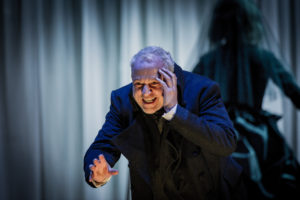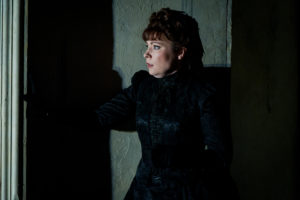Anyone who has read Pushkin’s Queen of Spades is aware of how far Modest’s libretto departs from the prototype of Pyotr Tchaikovsky’s opera. Pushkin’s Hermann is a repulsive cynic who merely pretends to love Lizavyeta Ivanovna in order to find out the Countess’ secret. His operatic counterpart hits bottom, torn between his feelings for Liza and his obsessive desire to get rich – in which he sees the only recipe for happiness and freedom. The one does not sit down at the table at the casino because he does not want to ‘sacrifice the essential in the hope of obtaining the superfluous’; the second does not play because he simply does not have the money to do so. The cowed Lizavyeta from the novella is only the old lady’s poor ward: having realized her own naïveté, her eyes fill with tears, she kicks the scoundrel out of the boudoir, proceeds to faint at the funeral and then disappear from the narrative, reappearing only during the epilogue, where the author explains that she ‘has married a very nice young man, who holds such-and-such a post and possesses a quite sizeable fortune.’ The proud Liza from the opera is the Countess’ granddaughter, engaged to a real, live prince, but despite that madly in love with the mysterious Herman, who divests her of all her illusions and drives her to suicide in the current of the Neva. Pushkin’s Hermann goes mad and spends the rest of his life in an insane asylum muttering the magic card formula under his breath. Tchaikovsky’s Herman shoots himself in the heart and dies with Liza’s image before his eyes, begging for forgiveness from Prince Yeletsky, whom the two of them had betrayed. The novella’s plot takes place in Pushkin’s era; the opera’s time frame has been moved back to the reign of Catherine the Great.
The divergences could be further multiplied, superficially to the disadvantage of the libretto of Queen of Spades, which many researchers have accused of dramaturgical incoherence and trivialization of the message of Pushkin’s novella. For the latter is indeed a masterpiece bespeaking masterful play with literary convention and with the reader, who remains in suspense to the very end as to what really happened, and what is a figment of the protagonist’s sick imagination. The reader must make a personal decision as to whether Tomsky’s story summing up the plot is a fairytale, a metaphor for the randomness governing human fortunes, a sharper’s anecdote about playing with marked cards, or perhaps all of the above at once. Besides, Pushkin knew what he was writing about: he himself was a passionate pharaoh player and, if we are to believe the reports of his contemporaries, he came a hair’s breadth one night from losing the fifth chapter of Eugene Onegin in a game with General Zagrazhsky.
The finale of Scene III. Photo: Robert Workman.
It is no wonder, then, that the first attempts to ‘re-Pushkinize’ the opera were made less than forty years after Queen of Spades’ St. Petersburg world première. It is interesting, however, that in all of these attempts, a thread appeared that had nothing to do even with Pushkin’s narrative, let alone Tchaikovsky’s. Konstantin Stanislavsky – in his staging from 1928 – made Herman the victim of a ‘politically hostile’ idea that finally led him to madness and ruin. Vsevolod Meyerhold’s concept (1935 production) was born amid the atmosphere of the Stalinist great terror: his Herman is from the beginning a reject on the verge of a breakdown, going around the bend under the influence of his obsession with cards. Each era in theatrical history is governed by its own order (or law of chaos, depending on one’s viewpoint). Even though Queen of Spades has made its way into the worldwide repertoire against much more resistance than Onegin, one could write entire volumes about its interpretations by stage directors, including the most recent one by Stefan Herheim, who turned it into an autobiographical tale about a musician imprisoned in the cage of his own sexuality.
However, before we set out to correct Tchaikovsky’s opera, it is worthwhile to realize that Queen of Spades is a separate work and, in certain respects, even more multilayered than Pushkin’s prototype. The librettist and composer took on the risky task of combining the antihero of an Enlightenmentesque anecdote with a red-blooded human being – specifically, a Russian Romantic hero. The lishniy chelovek – a superfluous, worthless man – is the collective victim of repression by Tsar Nikolai I after the suppression of the Decembrist revolt, a young nobleman with no prospects in life, motivated by a delusive feeling of superiority and equally vain faith in the power of his own intellect. The protagonist of Eugene Onegin – but also of later works by Turgenev, Goncharov and Dostoyevsky – with whom most of the 19th-century Russian intelligentsia sympathized, including Tchaikovsky. This is why the composer sobbed over ‘poor Herman’ as he finished writing the scene in which the suicide’s former friends bid him farewell with mournful song.
Appearances notwithstanding, the original idea of moving the narrative back to the era of Catherine the Great brings with it just as many incoherencies as later attempts to ‘restore’ Pushkin’s context to the opera (for example, the arietta from Grétry’s opera is at least half a century removed from the raptures of youth mentioned by the Countess). Tchaikovsky’s Queen of Spades draws on the treasury of tradition as much as it charges off into the future. Herman – even in an officer’s costume – is closer to Stavrogin and Verkhovensky from Dostoyevsky’s Demons than to the handsome boys as perfect as a painting of the great empress’ era. The musical narrative – despite the Mozartean pastiche in Act II – at times moves beyond Tchaikovsky’s era, for instance in Scene IV, where the composer builds up a mood of terror by using whole-tone scales. Let us add to this an entire arsenal of quotes, crypto-quotes and paraphrases, and spice it up with numerological symbolism (among other things, three acts, seven scenes and one Herman singing tirelessly throughout the entire work – in other words, a structural counterpart to the ‘three, seven, ace’ formula); and we get a work so complex that it is really not worthwhile to ‘enrich it’ via attempts to superimpose new meanings upon it.
Three, seven, ace. Herman (Peter Wedd) finds out the secret of the three cards. Photo: Robert Workman.
Fortunately, it is this path that young stage director Rodula Gaitanou has followed in her debut on the stage of London’s Opera Holland Park in an atmosphere of great expectations (the creator of the previous staging in 2006 was Martin Lloyd-Evans). Her task was all the more difficult in that this summer theatre – excellently-designed, but nonetheless open-air, separated from a public park only by a thin layer of tent canvas – is not particularly friendly to performers, who must constantly struggle with noises from the wind, helicopters flying over the city and moorhens rooting about in the bushes wafting in from offstage. The conditions also distract the audience, who observe most of the show from an ‘auditorium’ enveloped in waning daylight. The decision to play out the entire action in a semicircular space highlighted by the rhythm of Classical arches, in which simple props appear sporadically (stage design by Cordelia Chisholm), turned out to be extraordinarily apt – especially in combination with the sensibly-placed lighting (Simon Corder) and dazzling beauty of the costumes. Gaitanou did not carry out any ‘re-Pushkinization’ of Queen of Spades, but rather set the narrative in the framework of our collective imagination of 19th-century Russia, naturally approaching chronologically the time when the opera was written. Despite everything, however, it is evident that she read Pushkin’s novella carefully and with understanding, and then proceeded to utilize this knowledge for the benefit of the production. First of all, she disoriented the audience, skillfully disrupting the superficially realistic theatrical convention with a growing number of interventions ‘from the hereafter’, to which no one paid any attention at the beginning, only to awaken in Scene V in a world of truly Goyaesque visions and nightmares. Secondly, she alluded to the memories of Pushkin fans who remember how Hermann grabbed Lizavyeta by the hand and then disappeared before the girl managed to recover from her terror; how he later imagined the ace (queen of spades?) in the form of a giant spider; how the door slammed in the entrance hall – all of these gestures and images found a convincing theatrical counterpart in her concept.
Unfortunately, she did not manage to play out the scenes that are absent from Pushkin in an equally flawless manner. The initial episode in the summer garden dragged on mercilessly; the ball in Act II did not manage to take on sufficient panache; the otherwise wittily-conceived ‘pastoral scene’ clearly stood out from the rest of the concept. The production only really swung into action after the intermission, placed by the organizers before the second scene of Act II. One of the most beautiful moments was Herman’s oneiric dance with the half-conscious Countess, whom the young officer caresses first from a distance, himself horrified, not knowing whether the old lady recognizes in him an old lover, an illegitimate son, or only her nemesis. Liza’s suicide looked equally promising until the director decided that the tormented lady-love would shoot herself with a pistol taken away from Herman – it would have sufficed to make do with the even so already-utilized ‘engulfing’ of the heroine by undulating draperies that, with the aid of skillfully-placed lighting, would have given a convincing illusion of the waves of the Neva closing over the suicide. This disappointment was recompensed by the daring scene in the gambling den, from the players’ decadent dances straight through to Herman’s death in the finale carried out on a tilted table in the worrisome company of two ghosts: Liza, dressed in a white wedding dress; and her saturnine guardian angel, in the person of the Countess.
Liza (Natalya Romaniw) looks out for Herman on the banks of the Winter Canal. Photo: Robert Workman.
Gaitanou was clearly inclined towards the concept of Meyerhold, who imprinted his Herman with insanity from the very beginning of his production. Peter Wedd – after the beautifully-sung aria ‘Ya imyeni yeyo nye znayu’ – descended into madness too quickly, which weakened the internal tension of the later ‘Prosti, nyebesnoye sozdanye’, which in an ideal rendition lays bare the contrast between lyrical manipulation and the triumphal, indeed ecstatic feeling of a goal achieved. Fortunately, the man is an intelligent and tireless singer who, starting in Scene IV, built the dramaturgy of the character basically alone – with a voice consciously ‘dirtied’ in the middle register, overwhelming at the top of his range, as sonorous as a baritone in the low register, terrifying at the turning points in the plot. In the person of Natalya Romaniw (Liza), he found the perfect partner – the phenomenally-gifted Welsh singer has a true spinto soprano voice, full, round and dark in colour; she manages her phrasing with equal passion and musicality to that of her onstage lover, which found arresting expression in the duet from Act III, preceded by the heartbreaking monologue ‘Akh! istomilas ya goryem’, a resignation-laden lullaby for herself, a woman taking leave of an unfulfilled dream. The superbly-characterized Rosalind Plowright in the role of the Countess did not, unfortunately, manage to avoid falling into caricature: I grew up on the legendary performances of the Russian contraltos, among them Fayina Petrova and Nadezhda Obukhova, and I know that singing this role in a secure voice with balanced registers builds up considerably more terror than the most superb display of acting ability. Richard Burkhard (Tomsky), vocally accurate and conscious of his role, made a very good impression on me; Grant Doyle (Yeletsky) – none-too-authoritative, though impressive in his cultivated phrasing – somewhat less so. The scene in the gambling den was ‘stolen’ by Chekalinsky in the person of Aled Hall, one of the best British character tenors. Which does not change the fact that all previous impressions were eclipsed by Herman’s last aria ‘Shto nasha zhizn’ and the final scene of the protagonist’s death, filled out by a short, poignant a cappella chorus that literally closed the dead man’s eyes and left us with a feeling that in another world, the whole thing could have ended entirely differently.
For the superb choir, singing with vocal production worthy of the Bolshoi Theatre ensemble in Moscow in its best years under music director Rozhdzhestvensky, I shall spare no compliments. It was somewhat more difficult to get used to the orchestra’s playing under the baton of Peter Robinson, which made a wonderful impression in the ‘Classical’ pastiche passages, but lacked fullness of sound in the strings, the peculiarly ‘Russian’ breathing in long phrases and sufficient balance of proportions between the individual sections. I must admit, however, that in Scene IV – in musical terms probably the best in the entire performance – the woodwinds brought out details from this score that are not often heard on the world’s stages, and the obstinate sough of the violas against the background of the ominous pizzicato in the ’celli and double basses in the initial measures of the scene recompensed me even the anemic cantilena of the violins.
I was at the second performance of six – running with the same cast every two days, in immeasurably difficult acoustic conditions, at a summer opera ignored by most of my Polish professional colleagues. Featuring singers who give their all onstage. Most of them considerably better than the soloists in the aforementioned production from De Nationale Opera in Amsterdam under stage director Herheim. I shall allude again to Dostoyevsky and his Bobok in the translation of Constance Garnett: ‘I shall go to other tombs, I shall listen everywhere. Certainly one ought to listen everywhere and not merely at one spot in order to form an idea. […] But I shall certainly go back to those.’
Translated by: Karol Thornton-Remiszewski



